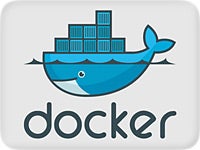After six months in private beta, the Docker for AWS service is now available as a public beta. Docker for AWS was first announced at Dockercon Seattle in June as an easier way for Docker container users to run on top of Amazon Web Services (AWS).
Docker for AWS provides a cluster of Docker engines (what Docker refers to as a Swarm) that runs on top of AWS, benefiting from AWS’s  Autoscaling, Elastic Load Balancer and Elastic Block Store.
Autoscaling, Elastic Load Balancer and Elastic Block Store.
In a blog post, Docker product manager Michael Fris commented that over the last six months the Docker for AWS technology has benefited from private beta user feedback, which has helped to improve the offering.
“All container logs are automatically sent to AWS CloudWatch for later inspection and analysis,” Fris wrote. “That means you no longer have to rummage around on hosts to find the error you’re looking for or worry that logs are lost if a worker is replaced.”
Additionally, Fris noted progress has also been made on diagnostics and upgradability as well as security.
“These are features that set a true production system apart from simple fire-and-forget templates that just spin up resources without thought for debugging or future upgrades,” Fris stated.
Docker for AWS should not be confused with Amazon’s own EC2 Container Service, which is already a generally available service on AWS. Amazon EC2 Container Service is a highly scalable Docker container management service that allows developers to run and manage distributed applications that run in Docker containers.
Docker is also working on a Docker for Azure offering that was also announced at Dockercon Seattle. That Docker for Azure product remains in private beta at this time.
Canonical Partners with Docker Inc on Docker Support
The open-source Docker Engine is widely available and integrated in many Linux distributions today. What isn’t nearly as widely implemented is the Commercially Supported (CS) Docker Engine that is backed by Docker Inc.
Canonical, the lead commercial vendor behind the Ubuntu Linux operating system, announced a formal partnership with Docker Inc on November 30, bringing the CS Docker Engine to Ubuntu. As part of the commercial support arrangement, Canonical provides the initial Level 1 and Level 2 technical support, while Docker, Inc provides the Level 3 support.
“Ubuntu customers will be able to take advantage of official Docker support — a service that is not available from most Linux distributions,” Nick Stinemates, Vice President, Business Development and Technical Alliances at Docker, said. ” Together, we have aligned to make it even easier for organizations to create new efficiencies across the entire software supply chain.”
Sean Michael Kerner is a senior editor at ServerWatch and InternetNews.com. Follow him on Twitter @TechJournalist

